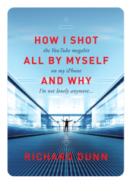
"How I Shot the YouTube Megahit All by Myself on My iPhone and Why I'm Not Lonely Anymore" *****
The enthusiasm pouring out of this book could power an entire plant on a grid. Richard Dunn has done what so many wished, wish, even yearn to do: become a known celebrity overnight. The book is about that, but also the creative tools he tapped to do it. This is mainly his authenticity, to stay true to oneself. If the philosophy borders on life-coaching, his ideas that have created an enviable life are many. He comes across as a family man who's worked hard, had an opportunity, and created a memorable story and journey out of an inconvenience that would dispirit many. Worth your time in droves.
The enthusiasm pouring out of this book could power an entire plant on a grid. Richard Dunn has done what so many wished, wish, even yearn to do: become a known celebrity overnight. The book is about that, but also the creative tools he tapped to do it. This is mainly his authenticity, to stay true to oneself. If the philosophy borders on life-coaching, his ideas that have created an enviable life are many. He comes across as a family man who's worked hard, had an opportunity, and created a memorable story and journey out of an inconvenience that would dispirit many. Worth your time in droves.

"Everything I Know About Filmmaking I Learned Watching Seven Samurai" ****
Let's be up front: this book can be tedious, but these pictures are really worth thousands of words. Author Pepperman expertly structures his book with sections titled Lesson Learned. He shows what the camera did, how it advances the story, and, perhaps most importantly, the effect on the viewer. He combines story with craft, details with ideas. After sixty years, this is still held up as one of the all-time great films. Richard Pepperman shows us why, and how, this film endures, and inspires.
Let's be up front: this book can be tedious, but these pictures are really worth thousands of words. Author Pepperman expertly structures his book with sections titled Lesson Learned. He shows what the camera did, how it advances the story, and, perhaps most importantly, the effect on the viewer. He combines story with craft, details with ideas. After sixty years, this is still held up as one of the all-time great films. Richard Pepperman shows us why, and how, this film endures, and inspires.
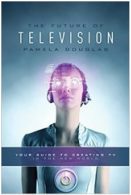
"The Future of Television" *****
This is terrific: a book that shows how storytelling has stayed true in principle in one of the great technology epicenters of the last seventy or so years. Pamela Douglas knows the medium, the markets, and what viewers in; she's also plugged right in to what is happening now in what some people believe causes the downfall of so much free time. Sprinkled throughout her book are interviews by industry insiders: writers, producers, and content creators of all forms who voice different angles on the submission, development, and creative processes. This book is not to be missed from a creator's viewpoint, but also a cultural one. TV really does travel far and wide and across cultures. For a future content creator, this journey is a must.
This is terrific: a book that shows how storytelling has stayed true in principle in one of the great technology epicenters of the last seventy or so years. Pamela Douglas knows the medium, the markets, and what viewers in; she's also plugged right in to what is happening now in what some people believe causes the downfall of so much free time. Sprinkled throughout her book are interviews by industry insiders: writers, producers, and content creators of all forms who voice different angles on the submission, development, and creative processes. This book is not to be missed from a creator's viewpoint, but also a cultural one. TV really does travel far and wide and across cultures. For a future content creator, this journey is a must.
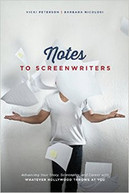
"Notes to Screenwriters" *****
Don't be fooled: this is not mere notes for screenwriters, it is the notes to screenwriters who want to work at their craft and succeed on every level. We've seen books on character, structure, and plot points. This book has it all, and how to navigate an industry that appears to be based on luck, especially in a social media world where the rules have changed. Vicki Peterson and Barbara Nicolosi clearly know the standards and rules for what stories connect with people, audiences, and get told worldwide. Chapter ten on how to reveal a plot applies both to the big screen and, as we've seen, long-running, successful television. This book should be read, then re-read about every six months or so to remind us of all we have to do to better ourselves, and be heard.
Don't be fooled: this is not mere notes for screenwriters, it is the notes to screenwriters who want to work at their craft and succeed on every level. We've seen books on character, structure, and plot points. This book has it all, and how to navigate an industry that appears to be based on luck, especially in a social media world where the rules have changed. Vicki Peterson and Barbara Nicolosi clearly know the standards and rules for what stories connect with people, audiences, and get told worldwide. Chapter ten on how to reveal a plot applies both to the big screen and, as we've seen, long-running, successful television. This book should be read, then re-read about every six months or so to remind us of all we have to do to better ourselves, and be heard.
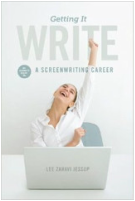
"Getting It Write: An Insider's Guide to a Screenwriting Career" *****
This book shows you how to be successful in what must be one of the hardest trades there is. Even more, Lee Jessup gives you levels of management, representation, and probably most of all, ways to plan a successful career. She gives focus to what is a wide open field that is tangible and real. I especially liked her tips of professionalism while solidifying one's voice and finding one's place, but even more so, building a career that is your own. This work is timeless.
This book shows you how to be successful in what must be one of the hardest trades there is. Even more, Lee Jessup gives you levels of management, representation, and probably most of all, ways to plan a successful career. She gives focus to what is a wide open field that is tangible and real. I especially liked her tips of professionalism while solidifying one's voice and finding one's place, but even more so, building a career that is your own. This work is timeless.
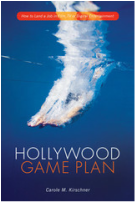
"Hollywood Game Plan: How to Land a Job in Film, TV and Digital Entertainment" *****
Carole Kirschner's book "Hollywood Game Plan" reads like it's from someone who has navigated, and chosen not to navigate, almost every corner in Los Angeles. You always hear the sayings: "there is no strategy in Hollywood," "there is no one work ethic in Hollywood," and of course William Goldman's "Nobody knows anything." Kirschner takes these in to account, is well aware of what jobs, titles, and positions are capable of doing in the creative and production process, and gives us a canvas to work from. Particularly helpful are the exercises which inspired me to be reflective on creativity, professionalism, and motivation. The chapter "Make yourself Irresistible to Decision Makers" embodies how to market yourself while developing your passions and positioning yourself in front of anyone in the industry. I personally don't plan on moving to L.A., yet have dreams of making it in the business. This book tells you how to take meetings, pitch yourself, and weave these aspects together to put your best foot forward and work steadily in what is often called an unforgiving town. A great, inspiring read.
Carole Kirschner's book "Hollywood Game Plan" reads like it's from someone who has navigated, and chosen not to navigate, almost every corner in Los Angeles. You always hear the sayings: "there is no strategy in Hollywood," "there is no one work ethic in Hollywood," and of course William Goldman's "Nobody knows anything." Kirschner takes these in to account, is well aware of what jobs, titles, and positions are capable of doing in the creative and production process, and gives us a canvas to work from. Particularly helpful are the exercises which inspired me to be reflective on creativity, professionalism, and motivation. The chapter "Make yourself Irresistible to Decision Makers" embodies how to market yourself while developing your passions and positioning yourself in front of anyone in the industry. I personally don't plan on moving to L.A., yet have dreams of making it in the business. This book tells you how to take meetings, pitch yourself, and weave these aspects together to put your best foot forward and work steadily in what is often called an unforgiving town. A great, inspiring read.

"Between the Scenes: What Every Film Director, Writer, and Editor Should Know About Scene Transition" *****
Jeffrey Michael Bays's "Between the Scenes" uncovers so many unsung facets to filmmaking, you wonder why this material hasn't come to light yet. The author is aware of characters, music, objects, symbols, and other layers on how and why films flow. The choices of transition, when to build or reveal character, build tension, or provoke or answer questions. These are all done on various levels with various films. This is pure cinema, and storytelling in this art, which is what we set out to do. Changes from one scene to another keep us watching and make us feel think, and wishing for more.
Jeffrey Michael Bays's "Between the Scenes" uncovers so many unsung facets to filmmaking, you wonder why this material hasn't come to light yet. The author is aware of characters, music, objects, symbols, and other layers on how and why films flow. The choices of transition, when to build or reveal character, build tension, or provoke or answer questions. These are all done on various levels with various films. This is pure cinema, and storytelling in this art, which is what we set out to do. Changes from one scene to another keep us watching and make us feel think, and wishing for more.
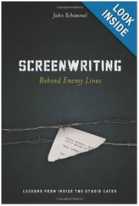
"Screenwriting Behind Enemy Lines" *****
John Schimmel's "Screenwriting Behind Enemy Lines" achieves a balance with story structure, industry navigation, and helpful examples. It's always great to read a book that brings elements to light in movies seen multiple times. Schimmel's use of "The Fugitive" and where the audience is in relation to the characters in the story is only one example. The author also separates the stand-outs from the forgettable, as in "The Avengers" versus "The Green Lantern." Yet Schimmel never loses his focus: to prepare, write, and polish a screenplay that will work and , above all, entertain and enlighten. What drives a film, with closer looks at various movies, is what drives this book to greatness.
John Schimmel's "Screenwriting Behind Enemy Lines" achieves a balance with story structure, industry navigation, and helpful examples. It's always great to read a book that brings elements to light in movies seen multiple times. Schimmel's use of "The Fugitive" and where the audience is in relation to the characters in the story is only one example. The author also separates the stand-outs from the forgettable, as in "The Avengers" versus "The Green Lantern." Yet Schimmel never loses his focus: to prepare, write, and polish a screenplay that will work and , above all, entertain and enlighten. What drives a film, with closer looks at various movies, is what drives this book to greatness.
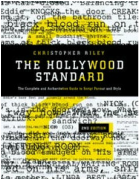
"The Hollywood Standard 2nd Edition" *****
Why format? I've heard and read of so many writers finishing a script, getting the format wrong, and their careers stalling, sometimes for long periods. At this point, Christopher Riley has probably read thousands of scripts from inside a studio. This book shows you how a great script reads and how to annotate shot headings, direction, and multi-camera film format so this is your script and idea coming to fruition. It reads so well as a reference guide for right next to your computer. With the 2nd edition, Riley has infused what he gleaned from the first in a changed industry over the last few years. Great edition and advice for getting your script to be professional and get read.
Why format? I've heard and read of so many writers finishing a script, getting the format wrong, and their careers stalling, sometimes for long periods. At this point, Christopher Riley has probably read thousands of scripts from inside a studio. This book shows you how a great script reads and how to annotate shot headings, direction, and multi-camera film format so this is your script and idea coming to fruition. It reads so well as a reference guide for right next to your computer. With the 2nd edition, Riley has infused what he gleaned from the first in a changed industry over the last few years. Great edition and advice for getting your script to be professional and get read.
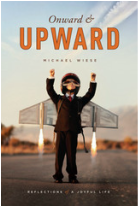
"Onward and Upward: Reflections of a Joyful Life" *****
I kept thinking of the sub-header of Michael Wiese's memoir "Onward & Upward." It is "Reflections of a Joyful Life." From his childhood in Illinois, we sense Michael has a yearning for something more than what's in school, with his family, and what's immediately before him. His spiritual path takes him, and us, to San Francisco, Japan, Bali, and Vestron Video, where he signs and works with some of the hottest names in comedy and show business. Even in the face of corporate America, this is a spiritual book with an epic feel and themes that apply to us all. We feel an interconnection when he spots a fellow filmmaker from the States on the streets in Manali near the Himalayas, and when he forges ahead with his spiritual films "Sacred Sites" and "Silver Box." Here is a multifaceted man who has traveled many places, then makes the Star Wars spoof "Hardware Wars," and finally calls Cornwall home. His journey is unique, and uniquely told, like bubbles or parts of a story that gradually come together and feel whole, and show us physical worlds seldom seen with philosophical lessons along the way that could have been passed off as trite, and instead are learned through personal experience. Occasionally tragic, often funny, Michael conveys time and place and beckons us to become active readers, thinkers, and learners. He uplifts and inspires. Reading "Onward and Upward" was a very fulfilling journey indeed.
I kept thinking of the sub-header of Michael Wiese's memoir "Onward & Upward." It is "Reflections of a Joyful Life." From his childhood in Illinois, we sense Michael has a yearning for something more than what's in school, with his family, and what's immediately before him. His spiritual path takes him, and us, to San Francisco, Japan, Bali, and Vestron Video, where he signs and works with some of the hottest names in comedy and show business. Even in the face of corporate America, this is a spiritual book with an epic feel and themes that apply to us all. We feel an interconnection when he spots a fellow filmmaker from the States on the streets in Manali near the Himalayas, and when he forges ahead with his spiritual films "Sacred Sites" and "Silver Box." Here is a multifaceted man who has traveled many places, then makes the Star Wars spoof "Hardware Wars," and finally calls Cornwall home. His journey is unique, and uniquely told, like bubbles or parts of a story that gradually come together and feel whole, and show us physical worlds seldom seen with philosophical lessons along the way that could have been passed off as trite, and instead are learned through personal experience. Occasionally tragic, often funny, Michael conveys time and place and beckons us to become active readers, thinkers, and learners. He uplifts and inspires. Reading "Onward and Upward" was a very fulfilling journey indeed.
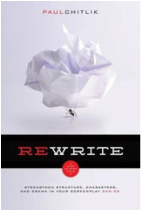
"Rewrite 2nd Edition: A Step-by-Step Guide to Strengthen Structure, Characters, and Drama in your Screenplay" *****
I was elated to pick up the second edition of "Rewrite" and see that it notes how movies are constantly changing, then showing you fundamentals in new ways. Structure and character are vital and create impact, and author Paul Chitlik shows all the dramatic elements with a wide array of examples. From Hans Gruber of "Die Hard," who works better than we realize and still quoted today, to how and why single scenes and sequences works in "Shakespeare in Love" and "Ratatouille." It is no surprise Chitlik is consulted worldwide for his knowledge depth, his recognition of superb storytelling, and how to polish ideas into a story that works. As the saying goes, writing is rewriting, and the latter is often harder. He lastly gives you much needed structure in the chapters "Paring it down" and "Finishing." Mandatory for any writer's shelf.
I was elated to pick up the second edition of "Rewrite" and see that it notes how movies are constantly changing, then showing you fundamentals in new ways. Structure and character are vital and create impact, and author Paul Chitlik shows all the dramatic elements with a wide array of examples. From Hans Gruber of "Die Hard," who works better than we realize and still quoted today, to how and why single scenes and sequences works in "Shakespeare in Love" and "Ratatouille." It is no surprise Chitlik is consulted worldwide for his knowledge depth, his recognition of superb storytelling, and how to polish ideas into a story that works. As the saying goes, writing is rewriting, and the latter is often harder. He lastly gives you much needed structure in the chapters "Paring it down" and "Finishing." Mandatory for any writer's shelf.
"The Friedkin Connection" ***
Ever since I saw "The French Connection" and "The Exorcist" over the summer of 1987, I've wondered what makes this guy tick. William Friedkin discloses a fair amount, racking up over 100 pages on the making of those two films, yet I wanted more on his later work. He even skips one of his lesser known movies, "Deal of the Century," a comic flop. This is a brisk read, and I finished it, which says something. His unexpected tour into opera, which I knew little of, shows his adventuresome side, yet I wanted more on how he feels, or those closest to him feel, about his career and where it's gone. Why are so many of his films so dark anyway? That said, his intelligence, values as a director, and journey through the industry are all palpable.
Ever since I saw "The French Connection" and "The Exorcist" over the summer of 1987, I've wondered what makes this guy tick. William Friedkin discloses a fair amount, racking up over 100 pages on the making of those two films, yet I wanted more on his later work. He even skips one of his lesser known movies, "Deal of the Century," a comic flop. This is a brisk read, and I finished it, which says something. His unexpected tour into opera, which I knew little of, shows his adventuresome side, yet I wanted more on how he feels, or those closest to him feel, about his career and where it's gone. Why are so many of his films so dark anyway? That said, his intelligence, values as a director, and journey through the industry are all palpable.

"Writers Rehab: A 12-Step Program for Writers Who Can't Get Their Acts Together" ****
D.B. Gilles's book "Writers Rehab" comes straight from the gut. This is someone who's been through the writing process, selling process, and probably a few rehabilitation-psychotherapy sessions. This is heavy-handed, and can drag in parts--he says "face yourself" or "own your mistakes" several ways, and that's what needs to happen. Each chapter starts with a famous quote, such as "You must do the things you think you cannot do" by Eleanor Roosevelt. True: Gilles is cheering you on, and taking you step-by-step to writing that will appeal to a broad audience. Marketing creeps in at the right times, as in the chapter "Scared Money Never Wins." He takes you through the selling process as well, and frames setbacks with optimism, treating disappointments as messengers. This whole book is one big message to keep going. I will.
D.B. Gilles's book "Writers Rehab" comes straight from the gut. This is someone who's been through the writing process, selling process, and probably a few rehabilitation-psychotherapy sessions. This is heavy-handed, and can drag in parts--he says "face yourself" or "own your mistakes" several ways, and that's what needs to happen. Each chapter starts with a famous quote, such as "You must do the things you think you cannot do" by Eleanor Roosevelt. True: Gilles is cheering you on, and taking you step-by-step to writing that will appeal to a broad audience. Marketing creeps in at the right times, as in the chapter "Scared Money Never Wins." He takes you through the selling process as well, and frames setbacks with optimism, treating disappointments as messengers. This whole book is one big message to keep going. I will.
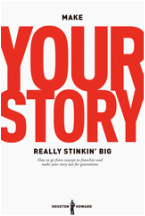
"Make Your Story Really Stinkin' Big: How To Go From Concept To Franchise And Make Your Story Last For Generations" **
I was ready for something big and expansive. I got that, much more, and ultimately too much. The feeling of being overwhelmed started with the intro.: a foreword, followed by a prologue entitled "A few things to get out of the way," and finally the section, "Why I decided to write this book." I was ready for action and ideas, and had to read a lot to get to both. Then comes the good news: Houston Howard knows what he's talking about, has been through the story creation process start to finish and pitched and formulated ideas and to the hilt. One of the best passages is the section "Build your characters a house to live in." This covers how to create a concept that hooks people with a high concept. This is good material, then come the fastballs with so many new terms that it makes for dense reading. I'd look at the summaries and homework parts at the end of chapters, then get to work.
I was ready for something big and expansive. I got that, much more, and ultimately too much. The feeling of being overwhelmed started with the intro.: a foreword, followed by a prologue entitled "A few things to get out of the way," and finally the section, "Why I decided to write this book." I was ready for action and ideas, and had to read a lot to get to both. Then comes the good news: Houston Howard knows what he's talking about, has been through the story creation process start to finish and pitched and formulated ideas and to the hilt. One of the best passages is the section "Build your characters a house to live in." This covers how to create a concept that hooks people with a high concept. This is good material, then come the fastballs with so many new terms that it makes for dense reading. I'd look at the summaries and homework parts at the end of chapters, then get to work.
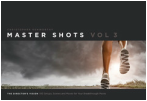
"Master Shots Vol 3: The Director's Vision: 100 Setups, Scenes and Moves for Your Breakthrough Movie" ****
You know a book has an impact on you when you see a movie or read a book, and you see things differently. As in, a deeper appreciation for choices the artists make on many levels. "Master Shots Vol. 3," which diagnoses shot selections from noteworthy films, namely "The Professional" (Or "Leon"), "Black Swan," and "Hard Candy," gives meaning to the shots and how they look, what we notice, what lenses and lighting are used, all shedding light on what the filmmaker is trying to achieve. For page-turning, it can appear slow and tedious. For all sets, however, this is an essential bag of tools for everyone lining up shots, aligning decisions to the script, right down to a story's core ideas.
You know a book has an impact on you when you see a movie or read a book, and you see things differently. As in, a deeper appreciation for choices the artists make on many levels. "Master Shots Vol. 3," which diagnoses shot selections from noteworthy films, namely "The Professional" (Or "Leon"), "Black Swan," and "Hard Candy," gives meaning to the shots and how they look, what we notice, what lenses and lighting are used, all shedding light on what the filmmaker is trying to achieve. For page-turning, it can appear slow and tedious. For all sets, however, this is an essential bag of tools for everyone lining up shots, aligning decisions to the script, right down to a story's core ideas.
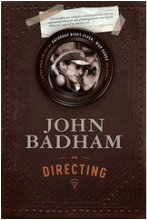
"John Badham On Directing: Notes from the Set of Saturday Night Fever, War Games, and More" *****
I grew up watching John Badham's films so I was excited about reading this book. It was a revelation and I'm happy to say that his book is as entertaining as his films. On Directing interweaves professional preparation for filmmaking and working with actors with storytelling ideas. Take the "Mystery, Surprise, Suspense" section: he shows how all three can be used successfully and less so with films that have stood the test of time such as "Fatal Attraction."
Badham quotes from a scale of A-list professionals: Jodie Foster, Allan Arkush, Sydney Pollack, Oliver Stone, and Richard Donner. His stories from the set, back to his first feature, "The Bingo Long Travelling All-Stars and Motor Kings," illustrate improvisation, flexibility, and openness to ideas. He later walks through how each scene relates to a film and story, using examples as diverse as "True Grit" and "Juno." The summaries at the end of each chapter are a handbook for all directors while shooting. John enlightens, encapsulates, and most of all, inspires. I recently read William Friedkin's memoir where he said you don't need to go to film school, just watch Hitchcock's movies. I'd say watch Hitchcock, listen to Badham.
I grew up watching John Badham's films so I was excited about reading this book. It was a revelation and I'm happy to say that his book is as entertaining as his films. On Directing interweaves professional preparation for filmmaking and working with actors with storytelling ideas. Take the "Mystery, Surprise, Suspense" section: he shows how all three can be used successfully and less so with films that have stood the test of time such as "Fatal Attraction."
Badham quotes from a scale of A-list professionals: Jodie Foster, Allan Arkush, Sydney Pollack, Oliver Stone, and Richard Donner. His stories from the set, back to his first feature, "The Bingo Long Travelling All-Stars and Motor Kings," illustrate improvisation, flexibility, and openness to ideas. He later walks through how each scene relates to a film and story, using examples as diverse as "True Grit" and "Juno." The summaries at the end of each chapter are a handbook for all directors while shooting. John enlightens, encapsulates, and most of all, inspires. I recently read William Friedkin's memoir where he said you don't need to go to film school, just watch Hitchcock's movies. I'd say watch Hitchcock, listen to Badham.
"Change Your Story, Change Your Life" *****
I started this book wondering what was in store. Jen Grisanti starts "Change Your Story" on a personal note, a big turning point in her entertainment career. Then she presents the tools. If you've read books on writing and storytelling, the principles will sound familiar: dilemmas, motivation, obstacles, and thematic question. All of these feel fresh here. They are also interwoven between Grisanti's professional ventures, including the motivation to start her own successful Jen Grisanti Consultancy, and personal journeys, such as her family. She also relates the societal, at one point she discussing marriage, which serves our desires to love, commit, conform, and have a "happily ever after" ending. Through it all are exercises, and Grisanti's book is structured yet never feels impersonal. This authentic method had me in one sitting. A must for aspiring writers, or anyone who needs the fire lit under them to weave their lives into art.
I started this book wondering what was in store. Jen Grisanti starts "Change Your Story" on a personal note, a big turning point in her entertainment career. Then she presents the tools. If you've read books on writing and storytelling, the principles will sound familiar: dilemmas, motivation, obstacles, and thematic question. All of these feel fresh here. They are also interwoven between Grisanti's professional ventures, including the motivation to start her own successful Jen Grisanti Consultancy, and personal journeys, such as her family. She also relates the societal, at one point she discussing marriage, which serves our desires to love, commit, conform, and have a "happily ever after" ending. Through it all are exercises, and Grisanti's book is structured yet never feels impersonal. This authentic method had me in one sitting. A must for aspiring writers, or anyone who needs the fire lit under them to weave their lives into art.
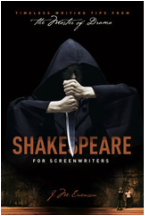
"Shakespeare for Screenwriters" *****
Concise and crucial, J.M. Evenson's "Shakespeare for Screenwriters" establishes early the importance of Shakespeare, the bard's underlying reasons and ideas that show up again and again. The structure of the book makes it surge: introducing the idea, how it affects story, and where it shows up in modern films. Each chapter concludes with key points to remember, movies to watch, and exercises. Evenson gets right to the root of ideas, exemplified in Chapter Five, titled King Lear, and asks, "Want to create a classic drama? Destroy a family." This relates to Hitchcock's "Shadow of a Doubt," "The Godfather" trilogy, and others.
Concise and crucial, J.M. Evenson's "Shakespeare for Screenwriters" establishes early the importance of Shakespeare, the bard's underlying reasons and ideas that show up again and again. The structure of the book makes it surge: introducing the idea, how it affects story, and where it shows up in modern films. Each chapter concludes with key points to remember, movies to watch, and exercises. Evenson gets right to the root of ideas, exemplified in Chapter Five, titled King Lear, and asks, "Want to create a classic drama? Destroy a family." This relates to Hitchcock's "Shadow of a Doubt," "The Godfather" trilogy, and others.

